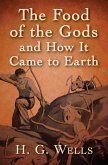The Food of the Gods and How It Came to Earth - H. G. Wells - The Food of the Gods and How It Came to Earth is a science fiction novel by H. G. Wells, first published in 1904. It is divided into three books. Book 1 introduces Mr Bensington, a research chemist. Along with Professor Redwood, he develops the 'food of the gods'; a food that accelerates the growth of children and turns them into giants when they become adults. Herbert George Wells (21 September 1866 - 13 August 1946) was an English writer. Prolific in many genres, he wrote dozens of novels, short stories, and works of social commentary, history, satire, biography and autobiography. His work also included two books on recreational war games. Wells is now best remembered for his science fiction novels and is sometimes called the "father of science fiction. During his own lifetime, however, he was most prominent as a forward-looking, even prophetic social critic who devoted his literary talents to the development of a progressive vision on a global scale. A futurist, he wrote a number of utopian works and foresaw the advent of aircraft, tanks, space travel, nuclear weapons, satellite television and something resembling the World Wide Web. His science fiction imagined time travel, alien invasion, invisibility, and biological engineering. Brian Aldiss referred to Wells as the "Shakespeare of science fiction", while American writer Charles Fort referred to him as a "wild talent". Wells rendered his works convincing by instilling commonplace detail alongside a single extraordinary assumption per work - dubbed "Wells's law" - leading Joseph Conrad to hail him in 1898 as "O Realist of the Fantastic!". His most notable science fiction works include The Time Machine (1895), which was his first novel, The Island of Doctor Moreau (1896), The Invisible Man (1897), The War of the Worlds (1898) and the military science fiction The War in the Air (1907). Wells was nominated for the Nobel Prize in Literature four times.
Dieser Download kann aus rechtlichen Gründen nur mit Rechnungsadresse in A, B, BG, CY, CZ, D, DK, EW, E, FIN, F, GR, H, IRL, I, LT, L, LR, M, NL, PL, P, R, S, SLO, SK ausgeliefert werden.









